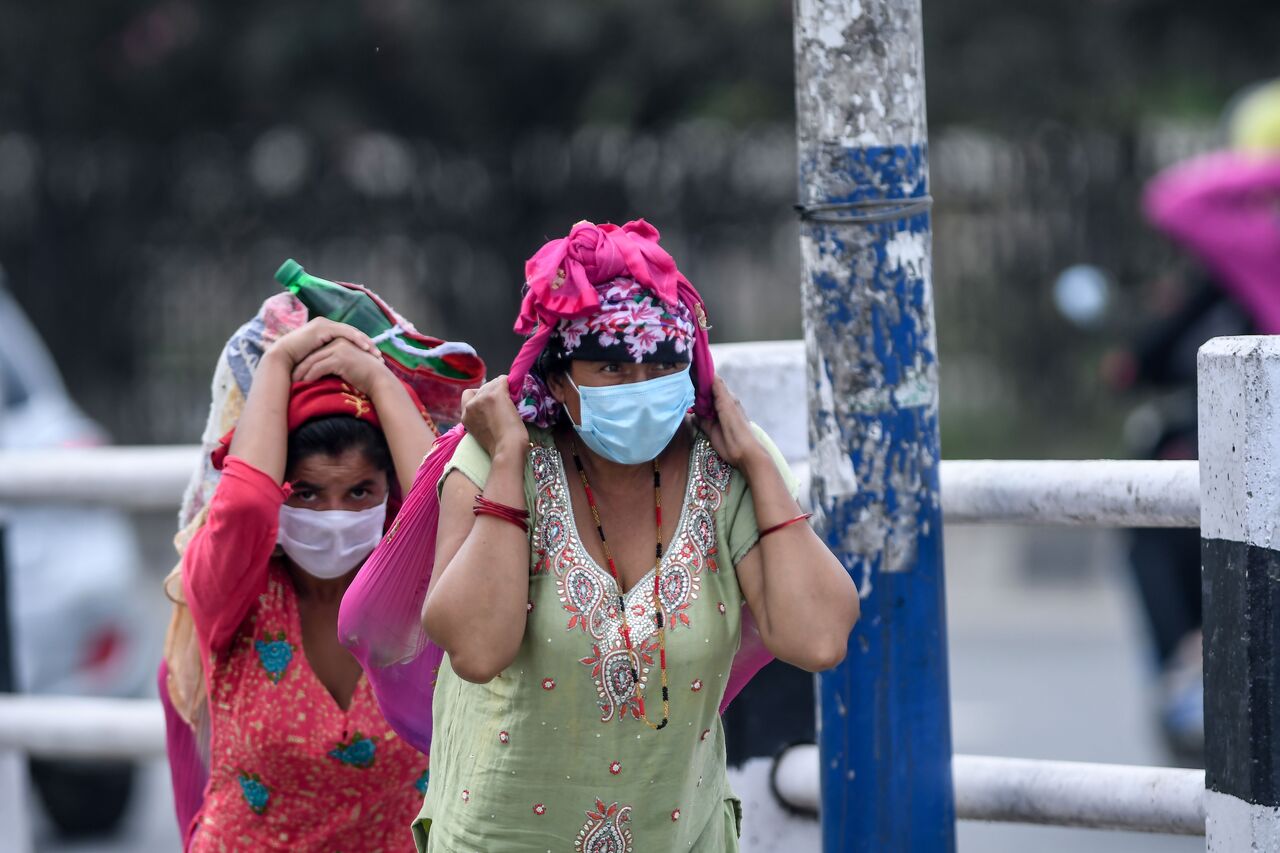Editorial Notes
State must stop Nepali women from being trafficked to Gulf countries: Kathmandu Post
In its editorial, the paper says that 2,333 trafficking victims have been rescued in the past four years, according to the Anti-Human Trafficking Bureau of the Nepal Police.
Sign up now: Get insights on Asia's fast-moving developments

Women carry bags of water bottles on their back in Kathmandu on June 11, 2020.
PHOTO: AFP
KATHMANDU (THE KATHMANDU POST/ASIA NEWS NETWORK) - The Nepal Embassy in India this week rescued 21 Nepali women who had been stranded in India following abortive attempts to travel to Persian Gulf countries for employment.
The women were headed to Oman, Kuwait and Iraq, the countries the government of Nepal has banned as destinations for female domestic workers.
Earlier, in February 2019, Manipur authorities had rescued 179 Nepali nationals -147 women and 32 men-before they could cross Moreh along the India-Myanmar border, which has emerged as the new route for the trafficking of Nepalis to the Gulf.
However, Manipur is not the only point of departure for Nepalis being trafficked to the Gulf countries from outside Nepal.
In July and August 2018, the Delhi Commission for Women rescued dozens of Nepali women purportedly headed to Kuwait and Iraq from New Delhi.
In May 2017, the Indian Central Investigation Bureau rescued 24 Nepali women from New Delhi headed to Kuwait. In July that year, the bureau rescued 11 Nepali women bound for Syria via New Delhi.
In August 2016, a joint team comprising Nepal Embassy officials in Sri Lanka and Sri Lankan authorities rescued 18 women from nearby Colombo.
These are but a few examples of the magnitude of the trafficking problem. According to the Anti-Human Trafficking Bureau of the Nepal Police, 2,333 trafficking victims had been rescued in the past four fiscal years. Of the rescued persons, 520 were girls under 18.
A majority of the female labour destinations in the Gulf have openings for domestic workers, a profession that the Nepal government deems unfit for Nepali women as they face risks of sexual and financial exploitation and human trafficking.
This means that women seeking jobs as domestic workers in those countries have no option but to take illegal routes with the help of human traffickers.
As the Tribhuvan International Airport shuts its exit door for such women, the traffickers find newer routes and strategies, leaving the government scrambling for control measures.
The open border between Nepal and India has been a bane in this regard, as traffickers can easily find escape routes via India.
The fact that the women rescued from Manipur this week had to languish for nine months explains the government's lethargic approach towards the issue.
The embassy blamed the Covid-19 lockdown for the delay in the rescue, a lame excuse given that the lockdown has been in effect for just over three months.
Moreover, even after they are rescued, the women are likely to try going abroad again due mostly to a lack of a financial support system at home.
Having spent huge sums of money on their abortive attempts already, the rescued women often go back to the traffickers to seek another illegal way out of the country.
The traffickers, meanwhile, continue to work uninterrupted due to the lack of formal complaints by the victims and the government's cluelessness.
The government's ban has not stopped the trafficking of Nepali women to domestic work destinations in the Gulf.
Conversely, it has led to further exploitation of the Nepali women who reach those destinations as they have no legal recourse in case of exploitation.
The problem is certainly not going to ameliorate unless the government is able to fill the loopholes.
For that, the government needs to ramp up its anti-trafficking measures to ensure that Nepali women are not trafficked to the Gulf countries illegally anymore.
Importantly, if it can't create enough employment opportunities at home, it must negotiate safer work environments for domestic workers in the labour destinations rather than imposing a blanket ban that is not working anyway.
The Kathmandu Post is a member of The Straits Times media partner Asia News Network, an alliance of 24 news media organisations.


